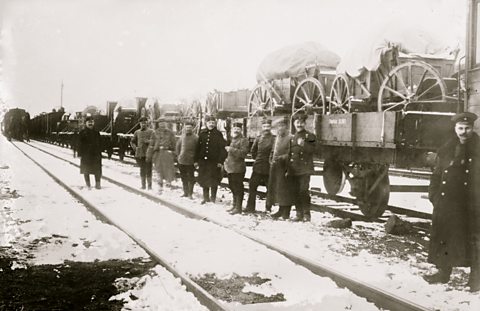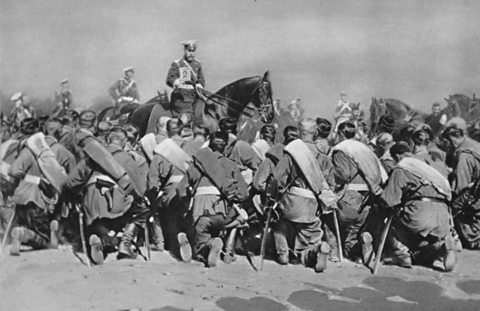Impact of World War One
The War brought terrible suffering for soldiers and civilians alike. Best estimates state that almost two million Russian soldiers were killed. A similar number of civilians also perished. Morale during this time was very low and the myth of the army as the Russian ÔÇśsteamrollerÔÇÖ had been vanquished.
The Russian people looked for someone to hold to account for their suffering. In 1915, the Tsar had declared himself Commander in Chief of the Army. This made him a suitable target for this discontent.
Military defeats
World War One was a total disaster for Russia. The Russian army suffered defeat after defeat at the hands of Germany.
1914

The Russians invaded Eastern Germany with two large armies. They were completely routed by smaller German forces at the battles of Tannenberg and the Masurian Lakes.
1915
Germany turned the full weight of its power against Russia and launched a series of onslaughts, including the Gorlice-Tarnow Offensive and the 2nd Battle of the Masurian Lakes.
The Germans and Austrians unified their command and were able to successively rout Russian forces, who lacked modern weaponry or enough supplies. The Russians were forced into retreat. Large areas of Russian territory including Lithuania and Poland, were overrun.
1916
For a time, the Russians achieved victory against the Germans and Austrians and regained some territory. However, the gains were minimal and Russia suffered heavy defeats late in the year.
Leadership

In 1915, Tsar Nicholas II took personal command of the army. He left St Petersburg and moved to army headquarters in Russian Poland.
Nicholas II may have believed that, by taking charge, his army would be inspired and would fight with renewed vigour. Unfortunately, the Tsar knew little about the command and organisation of large military forces. The series of defeats and humiliations continued.
The organisation of the Russian army deteriorated and there were massive shortages of ammunition, equipment, and medical supplies.
Nicholas II's decision to take charge meant that he was increasingly seen by the Russian people as having personal responsibility for the military disasters inflicted on Russia.